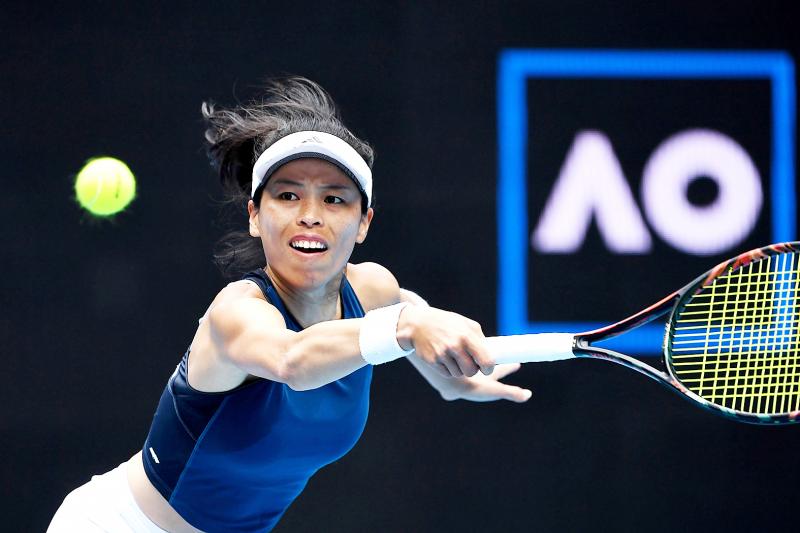Taiwan’s Hsieh Su-wei (謝淑薇) yesterday said that believing she was “still young” helped her sweep into a first Grand Slam quarter-final after 16 years of trying, becoming the first female player from Taiwan to reach a women’s singles quarter-final in a Grand Slam event, as well as the oldest player to make a last-eight debut in the Open era.
The 35-year-old overwhelmed Czech Marketa Vondrousova, a player 14 years her junior, in the Australian Open fourth round to set up an all-Asia clash with Japan’s Naomi Osaka.
Hsieh, the doubles world No. 1, but ranked No. 71 in singles, got an early break in the opening set and never looked troubled in outwitting the 19th seed 6-4, 6-2, a player she also toppled in a warm-up event in Abu Dhabi last month.

Photo: AFP
The Taiwanese made her Grand Slam debut in 2005, but had never gone beyond the fourth round before in 37 previous attempts.
“I try to pretend I’m only 18 years old. My mental [age] is very young,” Hsieh said on her secret for success.
“I also try to look little bit young this time, it helps a lot,” she said with a smile. “For me, the most important thing is to stay happy, to enjoy it, not get injury.”
Hsieh, by far the least decorated player left in her side of the draw, had already shown her mettle on Wednesday last week by beating 2019 US Open champion Bianca Andreescu.
One of the most unorthodox players in the women’s game, Hsieh won 80 percent of her first-service points against Vondrousova, who was hampered by 31 unforced errors.
Asked how she had been able to maintain her level over so many years, Hsieh recounted a story about how her boyfriend’s parents almost fell asleep when they first came to watch her at the French Open.
“Before Roland Garros, I was never able to beat the top-10 player,” Hsieh said. “I was dating my boyfriend, it was first year or second year, but his parents was first time coming to watch my match.”
“So I see the parents, I think they look like they’re going to fall asleep. I think I play really bad,” she said. “I tell myself: ‘OK, now I don’t care what happen, I will try to get every ball, try to make it look little bit better.’ At least I want to see them a little bit awake. That’s the way I get back, win the set and win the match. After that, I start winning [against] some top-10 players.”
Hsieh did not say when this happened, but before meeting Osaka she has a 8-25 record against top-10 players, with four of the wins coming at Grand Slams, including victory over Britain’s Johanna Konta, then ranked No. 8, at the 2017 French Open.
Additional reporting by staff writer

The Central Election Commission has amended election and recall regulations to require elected office candidates to provide proof that they have no Chinese citizenship, a Cabinet report said. The commission on Oct. 29 last year revised the Measures for the Permission of Family-based Residence, Long-term Residence and Settlement of People from the Mainland Area in the Taiwan Area (大陸地區人民在台灣地區依親居留長期居留或定居許可辦法), the Executive Yuan said in a report it submitted to the legislature for review. The revision requires Chinese citizens applying for permanent residency to submit notarial documents showing that they have lost their Chinese household record and have renounced — or have never

A magnitude 5.6 earthquake struck off the coast of Yilan County at 12:37pm today, with clear shaking felt across much of northern Taiwan. There were no immediate reports of damage. The epicenter of the quake was 16.9km east-southeast of Yilan County Hall offshore at a depth of 66.8km, Central Weather Administration (CWA) data showed. The maximum intensity registered at a 4 in Yilan County’s Nanao Township (南澳) on Taiwan’s seven-tier scale. Other parts of Yilan, as well as certain areas of Hualien County, Taipei, New Taipei City, Taoyuan, Hsinchu County, Taichung and Miaoli County, recorded intensities of 3. Residents of Yilan County and Taipei received

Taiwan has secured another breakthrough in fruit exports, with jujubes, dragon fruit and lychees approved for shipment to the EU, the Ministry of Agriculture said yesterday. The Animal and Plant Health Inspection Agency on Thursday received formal notification of the approval from the EU, the ministry said, adding that the decision was expected to expand Taiwanese fruit producers’ access to high-end European markets. Taiwan exported 126 tonnes of lychees last year, valued at US$1.48 million, with Japan accounting for 102 tonnes. Other export destinations included New Zealand, Hong Kong, the US and Australia, ministry data showed. Jujube exports totaled 103 tonnes, valued at

BIG SPENDERS: Foreign investors bought the most Taiwan equities since 2005, signaling confidence that an AI boom would continue to benefit chipmakers Taiwan Semiconductor Manufacturing Co’s (TSMC, 台積電) market capitalization swelled to US$2 trillion for the first time following a 4.25 percent rally in its American depositary receipts (ADR) overnight, putting the world’s biggest contract chipmaker sixth on the list of the world’s biggest companies by market capitalization, just behind Amazon.com Inc. The site CompaniesMarketcap.com ranked TSMC ahead of Saudi Aramco and Meta Platforms Inc. The Taiwanese company’s ADRs on Tuesday surged to US$385.75 on the New York Stock Exchange, as strong demand for artificial intelligence (AI) applications led to chip supply constraints and boost revenue growth to record-breaking levels. Each TSMC ADR represents